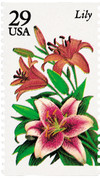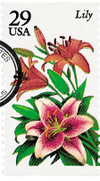
1994 29c Summer Garden Flowers: Lily
# 2829 - 1994 29c Summer Garden Flowers: Lily
$0.35 - $3.20
U.S. #2829
1994 Lily
Stamp Category: Commemorative
Series: Garden Flowers
Value: 29c – First-Class postage rate
First Day of Issue: April 28, 1994
First Day City: Cincinnati, Ohio
Quantity Issued: 35,202,800
Printed By: Bureau of Engraving and Printing
Printing Method: Lithographed and engraved
Format: Printed in four panes of 5 vertical se-tenant stamps
Perforations: 10.9 vertically
Why the stamp was issued: Partof the 5-stamp “summer” booklet set of the Garden Flowers Series, the Lily stamp was one of the “bright, pretty American stamps” the US Postal Service was hoping people would buy.
The stamp fulfilled the then-current first-class postage rate of 29c.
About the stamp design: The stamp was designed by artist Ned Seidler, who had designed the1993 garden flowers stamps. Seidler used the same clever technique as before, with the lily appearing to be part of the same bouquet, along with the zinnia, gladiolus, marigold, and rose.
The painting was a combination of watercolor and gouache. Gouache is a thicker, opaque form of watercolor.
First Day of Issue Ceremony: The ceremony was held at the Greater Cincinnati, Ohio, Flower and Garden Show.
Unusual fact about this stamp: George Amick, in Linn’s U.S. Stamp Yearbook 1994, writes that Linn’s Stamp News reported the cancellation of a Lily commemorative on cover (envelope) three days before it’s official First Day of issue.
About the Series: On May 15, 1993, the USPS issued the first installment in the Garden Flower Series, which would honor flowers that bloom in each of the four seasons.
This series was born out of the 1992 Wildflowers issue. That project had begun when the USPS asked an artist to produce color sketches of a group of garden flowers. Instead, the artist gave the USPS illustrations of wildflowers. The USPS liked them so much, it decided to create a 50-stamp pane, showing wildflowers that can be found in each state.
The USPS still liked the garden flowers idea. Part of the push behind these stamps had come from the sale of stamps in supermarkets and other retailers. People said they wanted “bright, pretty American stamps.” The USPS decided flower booklets would please the public. It ran TV commercials and full-page advertisements in stamp publications announcing “The flowers are in bloom at your post office. Buy them while they last!” and “Pick up a bunch.” The Garden Flowers booklet was the first to be produced on the new Goebel booklet machine, which was the first to print multicolor covers.
The stamps were issued on May 15, 1993, in Spokane, Washington at the 55th annual Spokane Lilac Festival and International Lilac Society Convention. Though not announced at the time, these stamps were to be the first in a new series of seasonal flower booklets.
The second booklet in the series was issued on April 28, 1994, at the Greater Cincinnati, Ohio, Flower and Garden Show. It featured summer garden flowers. Some people took issue with one of the stamps, which used the word “gladiola” rather than gladiolus.
The third booklet in the series was issued on September 19, 1995, at the Quail Botanical Gardens in Encinitas, California. This booklet featured fall blooms, though some people noted that depending on where you live in the country, some of these flowers could grow in the summer or even the spring. One USPS representative responded that “The idea with this series was to show a grouping of flowers that would be together somewhere in a garden at the same time. It’s not scientific. It’s meant to be more for mass-market appeal, as opposed to botanical.”
The final booklet in the series was issued on January 19, 1996, in Kennett Square, Pennsylvania. The flowers selected for these stamps are the hardiest plants that grow anywhere in the country that experiences winter weather.
The history behind the stamp:
One of the world’s most beautiful flowers, the lily is also one of the oldest plants known to man. It is mentioned in history for the first time on a tablet inscribed nearly 5,000 years ago in Sumer. The tablet tells of a Persian city surrounded by fields of lilies. That ancient city was called Susa, which means lily.
From Persia the lily spread to Crete, Egypt, Greece, and Rome. It is believed caravans of nomads took the edible bulbs along as food for their long journeys. Occasionally a bulb would drop and take root. Eventually the lily made it to northern Europe and England, most likely in the belongings of homesick Roman soldiers.
Wherever it went, the lily was usually regarded as a sacred flower. The Minoans, Greeks, and Romans associated it with their goddesses. Greek mythology claimed the flower had sprung from the milk of Hera, Zeus’ wife. Closely intertwined with Christian history, the white lily was used for centuries to symbolize the purity of the Virgin Mary and her role as Queen of the Angels.
Today there are more than 12,000 species offering a multitude of colors, shapes, and sizes. Popular varieties include the tiger lily, Easter lily, and Japanese lily.
U.S. #2829
1994 Lily
Stamp Category: Commemorative
Series: Garden Flowers
Value: 29c – First-Class postage rate
First Day of Issue: April 28, 1994
First Day City: Cincinnati, Ohio
Quantity Issued: 35,202,800
Printed By: Bureau of Engraving and Printing
Printing Method: Lithographed and engraved
Format: Printed in four panes of 5 vertical se-tenant stamps
Perforations: 10.9 vertically
Why the stamp was issued: Partof the 5-stamp “summer” booklet set of the Garden Flowers Series, the Lily stamp was one of the “bright, pretty American stamps” the US Postal Service was hoping people would buy.
The stamp fulfilled the then-current first-class postage rate of 29c.
About the stamp design: The stamp was designed by artist Ned Seidler, who had designed the1993 garden flowers stamps. Seidler used the same clever technique as before, with the lily appearing to be part of the same bouquet, along with the zinnia, gladiolus, marigold, and rose.
The painting was a combination of watercolor and gouache. Gouache is a thicker, opaque form of watercolor.
First Day of Issue Ceremony: The ceremony was held at the Greater Cincinnati, Ohio, Flower and Garden Show.
Unusual fact about this stamp: George Amick, in Linn’s U.S. Stamp Yearbook 1994, writes that Linn’s Stamp News reported the cancellation of a Lily commemorative on cover (envelope) three days before it’s official First Day of issue.
About the Series: On May 15, 1993, the USPS issued the first installment in the Garden Flower Series, which would honor flowers that bloom in each of the four seasons.
This series was born out of the 1992 Wildflowers issue. That project had begun when the USPS asked an artist to produce color sketches of a group of garden flowers. Instead, the artist gave the USPS illustrations of wildflowers. The USPS liked them so much, it decided to create a 50-stamp pane, showing wildflowers that can be found in each state.
The USPS still liked the garden flowers idea. Part of the push behind these stamps had come from the sale of stamps in supermarkets and other retailers. People said they wanted “bright, pretty American stamps.” The USPS decided flower booklets would please the public. It ran TV commercials and full-page advertisements in stamp publications announcing “The flowers are in bloom at your post office. Buy them while they last!” and “Pick up a bunch.” The Garden Flowers booklet was the first to be produced on the new Goebel booklet machine, which was the first to print multicolor covers.
The stamps were issued on May 15, 1993, in Spokane, Washington at the 55th annual Spokane Lilac Festival and International Lilac Society Convention. Though not announced at the time, these stamps were to be the first in a new series of seasonal flower booklets.
The second booklet in the series was issued on April 28, 1994, at the Greater Cincinnati, Ohio, Flower and Garden Show. It featured summer garden flowers. Some people took issue with one of the stamps, which used the word “gladiola” rather than gladiolus.
The third booklet in the series was issued on September 19, 1995, at the Quail Botanical Gardens in Encinitas, California. This booklet featured fall blooms, though some people noted that depending on where you live in the country, some of these flowers could grow in the summer or even the spring. One USPS representative responded that “The idea with this series was to show a grouping of flowers that would be together somewhere in a garden at the same time. It’s not scientific. It’s meant to be more for mass-market appeal, as opposed to botanical.”
The final booklet in the series was issued on January 19, 1996, in Kennett Square, Pennsylvania. The flowers selected for these stamps are the hardiest plants that grow anywhere in the country that experiences winter weather.
The history behind the stamp:
One of the world’s most beautiful flowers, the lily is also one of the oldest plants known to man. It is mentioned in history for the first time on a tablet inscribed nearly 5,000 years ago in Sumer. The tablet tells of a Persian city surrounded by fields of lilies. That ancient city was called Susa, which means lily.
From Persia the lily spread to Crete, Egypt, Greece, and Rome. It is believed caravans of nomads took the edible bulbs along as food for their long journeys. Occasionally a bulb would drop and take root. Eventually the lily made it to northern Europe and England, most likely in the belongings of homesick Roman soldiers.
Wherever it went, the lily was usually regarded as a sacred flower. The Minoans, Greeks, and Romans associated it with their goddesses. Greek mythology claimed the flower had sprung from the milk of Hera, Zeus’ wife. Closely intertwined with Christian history, the white lily was used for centuries to symbolize the purity of the Virgin Mary and her role as Queen of the Angels.
Today there are more than 12,000 species offering a multitude of colors, shapes, and sizes. Popular varieties include the tiger lily, Easter lily, and Japanese lily.











